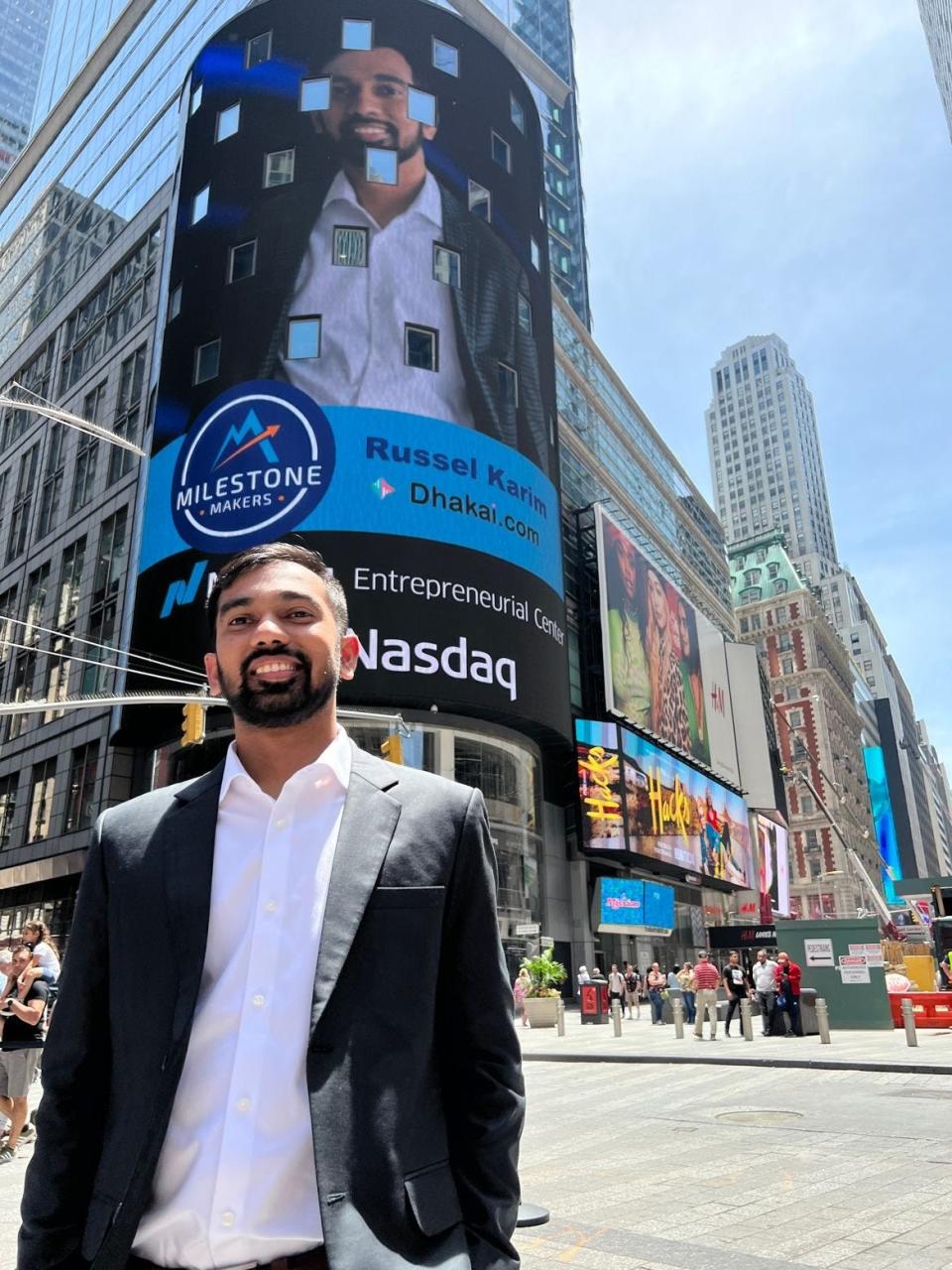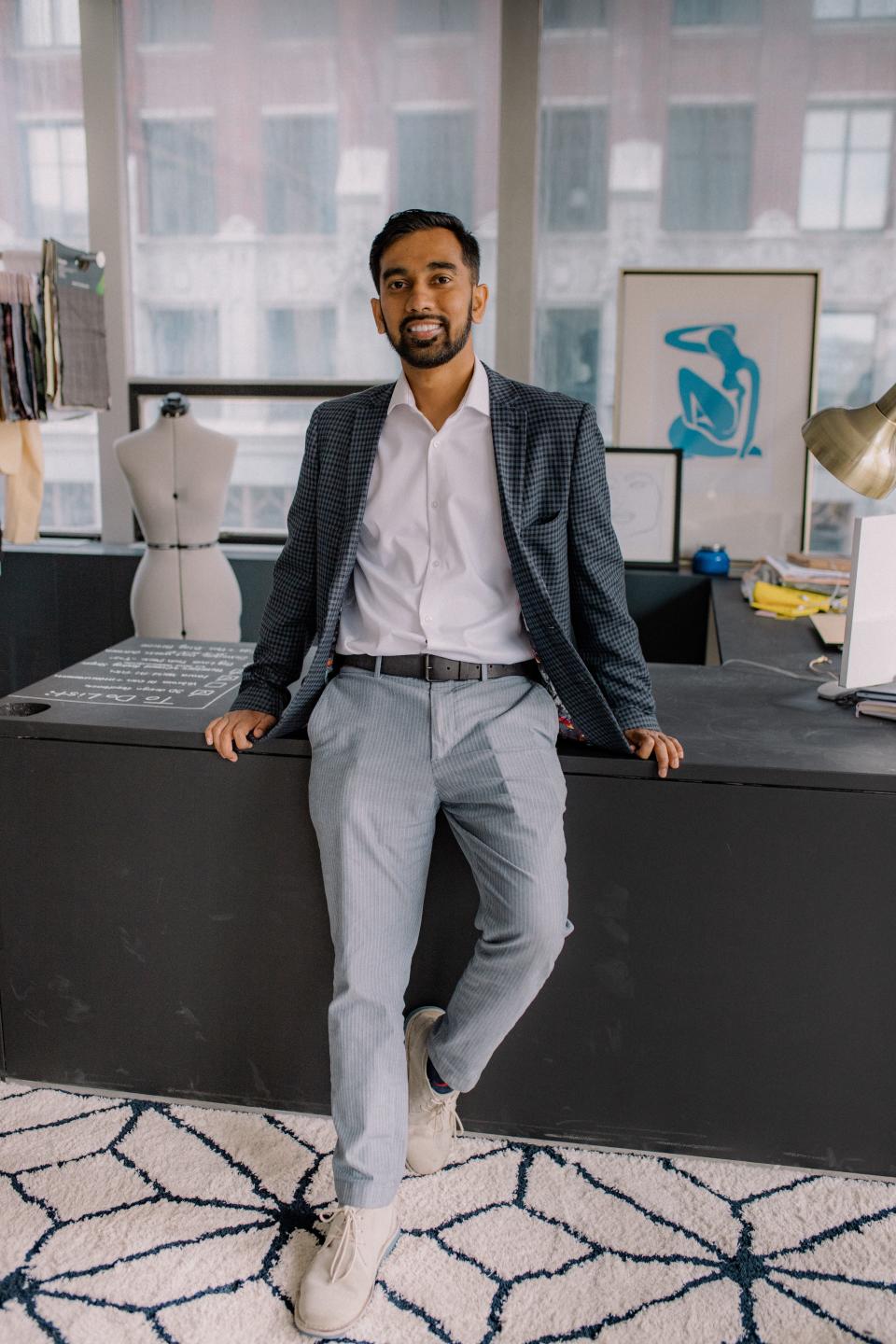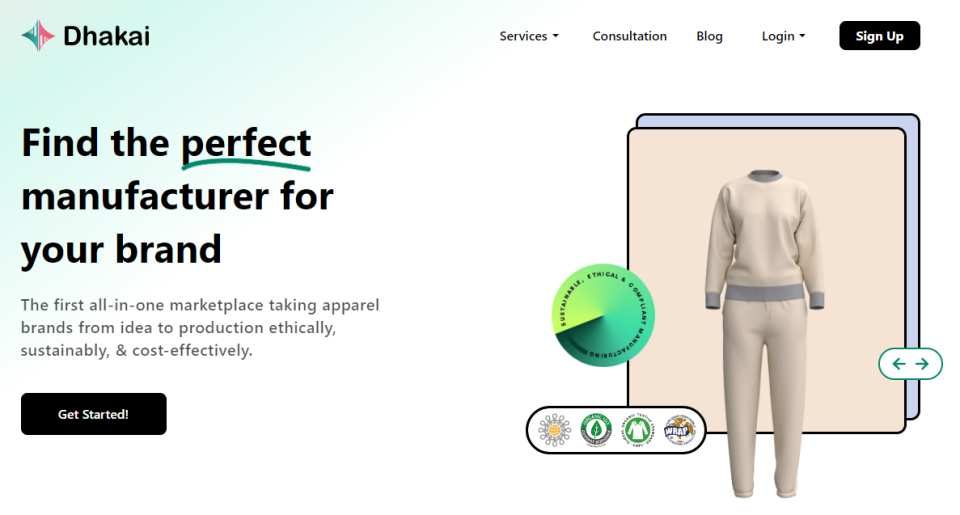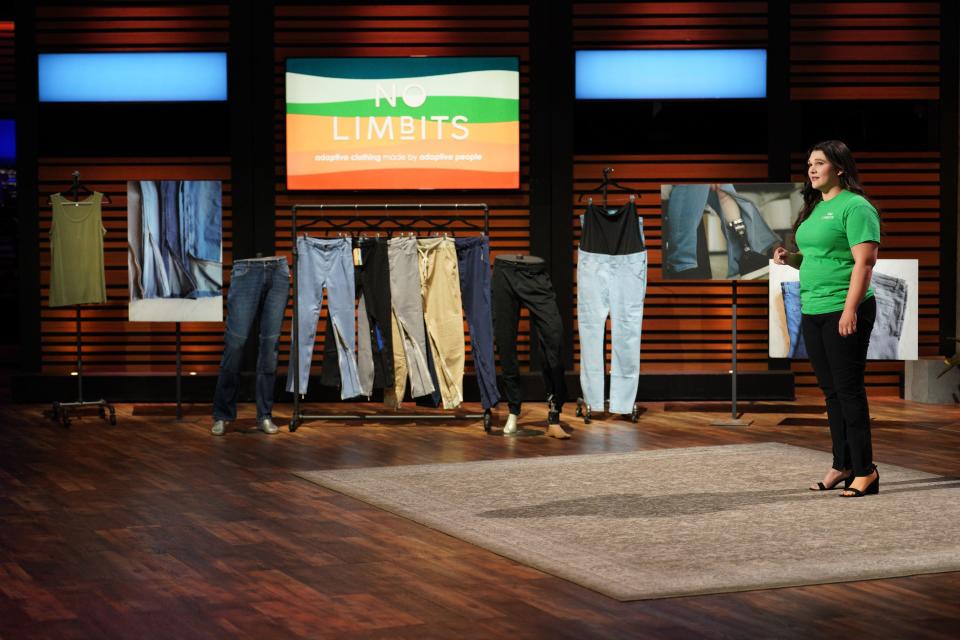Des Moines-based entrepreneur wants to make fashion industry supply chain 'sustainable,' 'ethical'
It takes about 700 gallons of fresh water to make a cotton T-shirt.
Another 1,000 for a pair of denim jeans.
Not a lot of people know the process of how their clothes are produced and the resources it takes to make them. Russel Karim wants to change that.
Karim is the CEO of Dhakai, a Des Moines-based technology company and marketplace that helps connect small- to mid-sized clothing brands in the U.S. with ethical and sustainable South Asian manufacturers.
Karim, who launched the business in 2021, says the company helps fashion brands oversee manufacturing from the loom to the final product. Dhakai connects clothing brands and designers to the manufacturers that make clothing with sustainability in mind. So they might use less water per pair of jeans or T-shirt manufactured.
“Dhakai is really built based on (the fact that) we want to tell both sides of the story — not just the brand’s side," he said. "We want to tell the story of people who are making our clothes and how this positively impacted the communities."
In June, Karim completed the Nasdaq Milestone Makers, a 12-week program in New York City that pairs entrepreneurs with coaches in their industry to receive business mentoring and training. This year's program emphasized sustainability and climate actions.

Growing up with the clothing industry in Bangladesh
Karim says his childhood was centered around clothing production growing up in Dhaka, Bangladesh, where he saw the positives and negatives of the industry. His parents and several relatives were involved in the clothing supply chain.
"Growing up, we would talk about the buyers, different brands, and supply chain challenges at our dinner table," he said.
The garment and textile business is the No. 1 industry in Bangladesh, accounting for 80% of the country’s exports, according to Forbes. Bangladesh is the second-largest individual country in the world for apparel manufacturing, second only to China. H&M, Target and Marks and Spencer are among the global brands that contract with garment factories in Bangladesh.
The multi-billion-dollar export industry is a big accomplishment for a fairly young country, which gained its independence in 1971, Karim said.
"This has created a lot of jobs. It's created a lot of opportunities," he said. "Almost 80% of the people who work in the garment industry are women."
But there are negatives, too.
The country’s powerful garment industry has been plagued by a series of disasters over the last decade, including a fire in November 2012 at the Tazreen factory that killed 112 and caused the building to collapse. The collapse of the Rana Plaza building, which housed five garment factories, less than a year later, killed more than 1,000 people and injured another 2,500.
Karim said the disasters “shook the whole industry,” prompting some overdue, industry-wide audits and compliance initiatives. He pointed to Bangladesh also having more than 140 factories certified by LEED, a U.S.-based rating system for green buildings.
Through Dhakai, Karim hopes he can continue making progress in improving the industry.
“I know there are a lot of negative things that happened,” he said. But "things have changed, and we need to tell a better story of what's happening with clothes manufacturing."
Karim is no stranger to entrepreneurship. After studying computer science and entrepreneurship at the University of Northern Iowa, he kickstarted a few companies including a food-delivery service called Food Runner in 2016, which serviced Cedar Falls, Waterloo, Council Bluffs and St. Cloud, Minnesota. It was sold to EatStreet in June 2019.
But he said he always had a vested interest in the clothing industry because of his upbringing.
“I know how many people's lives are impacted,” he said. “The garment industry brings in 80% of GDP, but also, I have seen those struggles … of factories trying to find the right buyers, or being able to connect effectively, or having logistical issues."

A 'Shopify' for a clothing supply chain
Karim says the company’s goal is to solve one of the largest problems in the supply chain: the lack of accessibility and compliant manufacturing, particularly for the “underserved” small-to-mid-sized brands.
While large brands often have resources to establish and manage relationships with factories, Karim says finding an ethical and sustainable manufacturer for smaller businesses is like climbing Mount Everest.
"You are a mid-sized brand. Where do you even start?" he said. "It's not only (about) finding a factory, it's also finding a green-level factory. Can you send $100,000 to a factory in a foreign country? Do you understand their language? Do you understand their culture? Are they going to deliver what they say they're going to deliver?"
Intermediaries — or "middle men" who work between the brand and the producer — also take hefty percentages, making the process opaque. Sometimes, Karim says, there are multiple middle men.
"You wouldn't know which factory is making the products or what percentage they're taking," he said. "And clothes can cost up to three times the cost of production for some of the brands because every middle man would upcharge between 7% and 15% of the market, so it just keeps adding up."
Karim says brands have direct access to a factory through Dhakai, so companies know who they're working with, their compliance policies and their production processes.
The process begins with the brand's idea, Karim said. Dhakai will make a physical sample of the product and once the brand owner OKs the sample, Dhakai helps match them with the right factory to produce the product.
After the product is made, Dhakai helps audit the product to make sure it's up to quality. Dhakai also helps companies navigate logistics including international payment and shipment, Karim said.

"We're becoming the 'Shopify' for your supply chain," he said. "We're like the operating system for small-business clothing brands."
He says by standing in for intermediaries, Dhakai reduces cost by up to 30%, allowing brands to get a better, more sustainable product for less.
Dhakai uses a four-step process to vet manufacturers and then works with companies to match their needs in order to find the right factory for them, according to a release from the company. Its compliance process includes collaboration with international textile associations, sustainability initiatives, and workers’ rights non-profits.
Karim says Dhakai has more than 500 factories featured on its website. So far, more than 100 have been verified, which includes Dhakai team members touring the facilities and testing the factories' products.
Karim’s first customer was Erica Cole, founder of No Limbits, an adaptive apparel company that began with prosthetic limb covers. Cole, a University of Iowa graduate, lost her leg in a car crash in 2018 and quickly discovered when it came to clothes, practicality won over personal style.
Cole’s company launched a Kickstarter campaign in April 2021 for the Amp Pant, designed for people who have prosthetic limbs, which quickly caught the attention of producers of “Shark Tank."

After pitching the idea to the "sharks," Cole walked away with a $100,000 investment from Dallas Mavericks owner Mark Cuban and Emma Grede, co-founder of the inclusive fashion company Good American.
Since then, the business plans to launch a clothing collection for those in wheelchairs and those with sensory-processing disorders, according to the No Limbits website.
Dhakai has 20 employees, including 10 in a Dhaka, Bangladesh, office, and works with about 45 brands directly and has about 200 brands in the pipeline, he said. He said he plans to double his team by next year.
Karim acknowledges his company is not perfect and improving the clothing industry takes time. His goal is to simply "do better."
"I think sustainability is not a sprint, it's a marathon," he said. "When you run a marathon, you have to prepare, you gotta gradually warm up. If I don't take action now, we'll never (get there)."
Tips for buying better
Consumers can make a big difference.
Looking at labels and being aware of where your clothing comes from is important, he says. So is understanding clothing's impact.
"One of the best things a consumer can do is buy less, buy more quality products," he said. "For example, with fast fashion, a lot of people wear clothes once. (Instead), can you buy a quality product that you can wear five times, 10 times, 20 times, for a year, for two?"
Virginia Barreda is a trending and general assignment reporter for the Des Moines Register. She can be reached at vbarreda@gannett.com. Follow her on Twitter at @vbarreda2.
This article originally appeared on Des Moines Register: Iowa entrepreneur wants to make fashion supply chain sustainable

